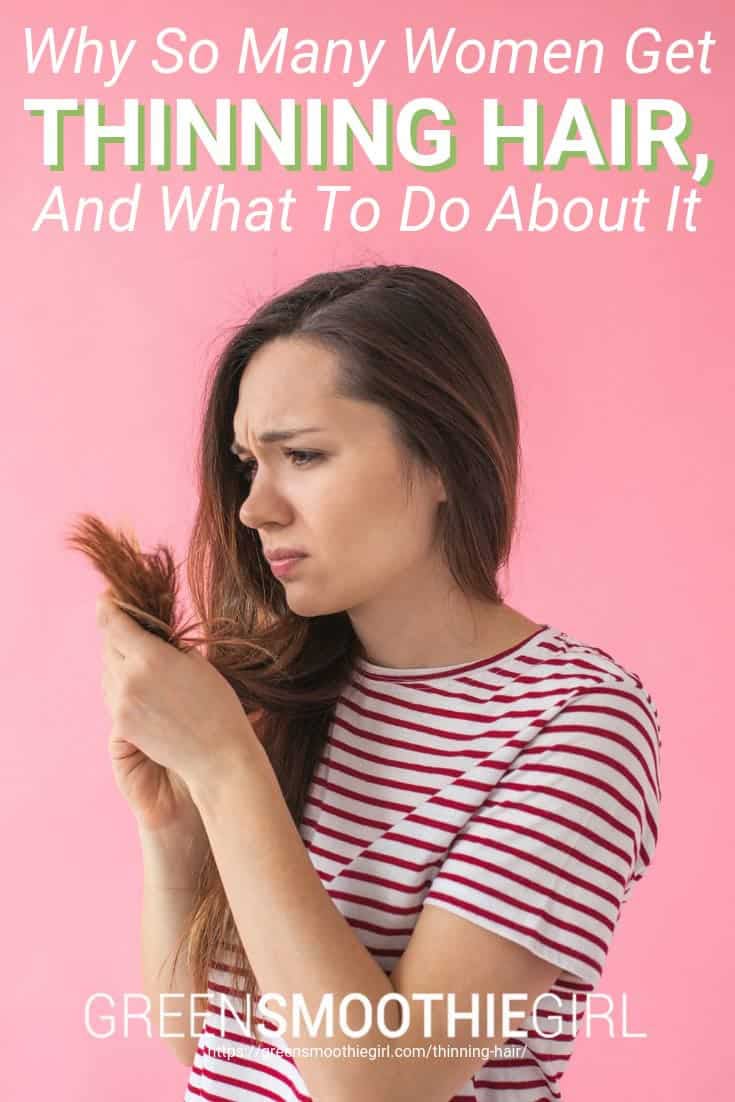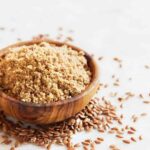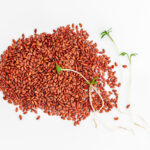Why So Many Women Get Thinning Hair, and What To Do About It
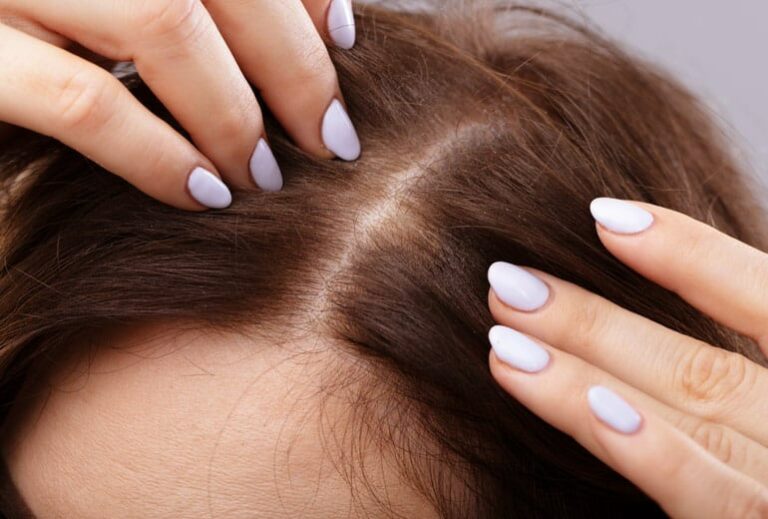
Hair loss is usually written off as a cosmetic issue that affects middle-aged men who were unlucky enough to get the dreaded “bald gene” from their mothers.
But women of all ages with thinning hair know a different story — and the stats back them up.
In this post:
- The Skinny on the Thin Hair Epidemic
- Common Deficiencies That Can Cause Thinning Hair
- Medical Conditions that Can Cause Thinning Hair
- Environmental and Circumstantial Factors That Can Cause Thinning Hair
- Tips For How To Grow Thicker, Healthier Hair
- Conclusions About Thinning Hair
According to the American Hair Loss Association, around 40% of people who experience hair loss are women. That’s 21 million women in the United States alone. And by age 50, approximately half of all women see significantly more hair in the shower drain.
Read on to learn why so many of us have thinning hair, and tips you can take to stop and reverse hair loss, for thicker and healthier hair.
The Skinny on the Thin Hair Epidemic
While hair loss can definitely be distressing from a cosmetic perspective — as evidenced by one survey from the International Society of Hair Restoration Surgery (ISHRS) which revealed that 73% of people would trade a treasured personal possession for thicker, fuller hair1—the problem is actually a lot bigger than appearances.
One landmark study showed that premature hair loss and premature graying were higher risk factors for heart disease than obesity.2 One of the study’s architects, an associate professor in the cardiology department at U.N. Mehta Institute of Cardiology and Research Centre said, “Baldness and premature graying should be considered risk factors for coronary artery disease. These factors may indicate biological — rather than chronological — age, which may be important in determining total cardiovascular risk.”
In other words, wanting beautiful, shiny, red-carpet-worthy locks isn’t vain. Thin, brittle, or prematurely gray hair can be a strong indicator of quite a few medical conditions, vitamin and mineral deficiencies, poor nutrition, and dangerous environmental factors.
And alarmingly, research shows that we’re losing our hair earlier than ever. One recent study found that the rising generation in China is losing their hair earlier than their parents or grandparents.3
Common Deficiencies That Can Cause Thinning Hair
While correcting the following micronutrient and vitamin deficiencies will help you get thicker, shinier hair, think of that as your cherry on top--not necessarily the reason for taking them. Unhealthy hair is an alarm bell, pointing to poor health. And by listening to that alarm bell and taking better care of your health, you’ll also be rewarded with beautiful, thicker hair!
Iodine Deficiency
Your thyroid needs iodine for normal cell metabolism throughout the body4 — including your hair! Thyroid hormones T3 and T4 (triiodothyronine and thyroxine) are huge factors in determining how fast your hair grows, and even its texture and color.
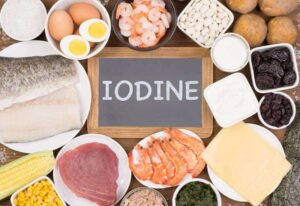
Thyroid hormones help regulate many aspects of how your hair grows.
If you notice symptoms like tiredness, brittle hair and nails, stress, weight gain, and bags under your eyes, you may well have an iodine deficiency. Get your hormone levels checked and your iodine levels tested, and add more iodine-rich foods to your diet (seaweed and kelp are two of the very best sources!)
Deficiencies in Vitamin D and Zinc
These two important micronutrients work hand in hand, playing a vital role in how your cells communicate, how quickly they repair damage, how easily they bind with protein, and how efficiently they interact with hormones.
If you’re deficient in either of these micronutrients, you may notice unhealthy hair, as well as tiredness, mood disorders, and more susceptibility to illness.
Sulfur Deficiency
Organic sulfur (the colorless non-stinky kind, not the yellow gas you’re probably imagining!) is non-negotiable for strong, thick, vibrant hair. And because of modern farming practices that strip the soil of nutrients, as well as pesticides that break the sulfur cycle in plants, most of us aren’t getting enough organic sulfur from the food we eat.
Eating organic, sulfur-rich foods and supplementing with organic sulfur can help you say goodbye to gray hair, drastically reduce your hair loss, and help unhealthy hair cells start producing keratin, pigment, and collagen again.
How? Sulfur helps draw oxygen out of the water you drink and the air you breathe, delivering it to your cells and vital organs. Sulfur isn’t called the “miracle mineral” for nothing!
[Related: Health Benefits of Sulfur, and Why You’re Probably Deficient]
Essential Fatty Acid Deficiency
If you’re not getting enough essential fatty acids (like Omega 3) in your diet, you’re not likely to see the thick, beautiful hair of your dreams.
Essential fatty acids help prevent hair loss, encourage new growth, fortify your hair follicles, and keep your scalp from flaking. Essential fatty acids will also do wonders for your skin and nails — not to mention your brain and heart!
B12 Deficiency
If you’re not getting enough B12, you might feel pretty lousy--tired, sick a lot, weak, and generally unwell. You’re also likely to have thinning or brittle hair, since B12 has a direct effect on red blood cells’ ability to get oxygen into your cells.
B12 deficiency is especially common in people who eat a vegan or primarily plant-based diet,5 since B12 is mostly found in animal products. If that’s you, add mushrooms, nutritional yeast, and spirulina to your diet (three of the very few plant-based sources of B12). If you’re seriously devidient, you may want to supplement with organic purple laver (nori)6 i or a high-quality methyl B12 supplement.
Iron Deficiency
Lack of iron is another extremely common cause of hair loss. Iron is required to make hair proteins— and without enough of it, you’re likely to experience a lot of breakage and hair loss.
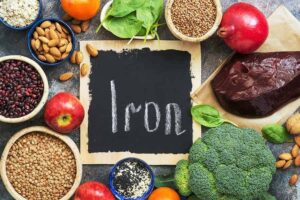
Iron is a mineral that creates building blocks for hair proteins.
Iron deficiency is especially common in women, because of blood lost in monthly cycles and increased iron needs during pregnancy. It’s also common in people who decide to undertake very low carbohydrate diets. While many people think they have to eat animal protein like beef to get iron from food, there are plenty of plant-based sources, including beans, peas, lentils, and other legumes.
If you decide to supplement with iron because of your diet or medical practitioner’s recommendation, make sure you’re getting a high-quality, plant-based iron supplement that is bioavailable (run the other direction from cheap, chemical iron supplements!).
[Related: How To Eat Legumes]
Medical Conditions that Can Cause Thinning Hair
Hair loss can also be an indicator of a medical condition that may or may not be diagnosed yet. In fact, for many of these conditions, hair loss is one of the earliest, subtle signs:
Thyroid Disorders
Thyroid disorders like Hashimoto’s, Grave’s Disease, or Hypothyroidism often show up in the skin, nails and hair as one of its first signs. The hormones your thyroid produces are critical for protein production, cell metabolism, and cell growth--including the cells and proteins in your hair follicles.
[Related: Vibe Podcast Episode 50: Thyroid Disorder With Dr. Alan Christianson]
Pregnancy and Lactation
During the first half of pregnancy, your baby’s thyroid doesn’t function on its own. In other words, if there’s a deficiency in iodine or other vital nutrients for the all-important thyroid7 during pregnancy, your body will divert those key nutrients to your baby--at your expense. (This may be the reason why so many women suffer thyroid disorder after having babies.)
And it’s not just your thyroid that can easily get neglected during pregnancy and lactation. Vitamin D, iron, and a slew of other minerals required to create and sustain another human being can easily be depleted without good nutrition and supplementation--leading to hair loss and breakage during pregnancy and beyond.
PCOS (Polycystic Ovary Syndrome)
Female hormones, also called estrogens, make a big difference in how quickly hair grows, whether or not it stays in growth mode, and when it falls out.
An overabundance of male hormones, or androgens, can wreak havoc on hair growth cycles, leading to hair loss.
Polycystic Ovary Syndrome causes a hormone imbalance in the body, leading to too many androgens, irregular periods, difficulty getting pregnant, and hair loss.
Unbalanced pH
A body pH that is highly acidic can lead to hair loss as well as unhealthy skin, susceptibility to disease, and inflammation. The following factors can make your body Ph more acidic:
- Poor nutrition and a diet that includes a lot of processed foods
- Consumption of coffee and soft drinks (both highly acid forming)
- A diet high in dairy and animal proteins (especially meat and eggs)
- Consuming food or water that has been contaminated by pesticides and fertilizers.
To help restore a healthy pH, opt for mineral-rich water, cut out the processed foods, add plenty of vegetables and greens to your diet (think green smoothies!), and avoid animal products and dairy.
Autoimmune Conditions
Autoimmune disorders like Lupus, Rheumatoid Arthritis, or Alopecia, in which the body has difficulty distinguishing friendly tissues and cells from harmful invaders or toxins, can lead to hair loss as the body attacks and destroys healthy hair follicles.
Environmental and Circumstantial Factors That Can Cause Thinning Hair
There are quite a few reasons you might have thinning hair that come from your environment, or just your life circumstances. Being aware of them can not only help you get healthier hair, but manage those circumstances and environmental factors in a healthier way.
Stress
Cartoons of people pulling their hair in frustration are actually pretty accurate. Hair loss and stress DO go hand in hand, for a couple of reasons.
First, stress can increase your percentage of androgens,8 which shortens the life cycle of your hair and can make it fall out more quickly. Second, stress raises cortisol levels, which means your adrenal glands are busy creating cortisol, and not the hormones needed for healthy hair.
Interestingly enough, many people with very low cortisol levels also see a lot of hair loss. But that’s because of adrenal fatigue and burnout from producing too much cortisol over long periods of time.
[Related: 11 Natural Ways To Deal With Stress]
Endocrine Disruptors
As you’ve probably gathered by now, healthy hair depends a lot on healthy hormone levels, and healthy hormone-creating organs like the thyroid and the gut. It makes sense, then, that endocrine disruptors (chemicals and substances that wreak havoc with your hormone receptors and organs), can cause problems with your hair, too.
Common chemicals in our homes, food, drinking water, and product packaging can make different endocrine organs go haywire. For instance, numerous endocrine disruptors (like perchlorate, found in all kinds of processed foods like boxed mac and cheese), make it difficult for the thyroid to absorb iodine and produce thyroid hormones.
Aging and Menopause
Hair becomes thinner and finer, with a shorter life cycle as we age and as women get closer to perimenopause and menopause. Why? Like other body systems, wear and tear starts to take its toll on the efficiency and resilience of organs, cells, and hormones that support healthy hair.
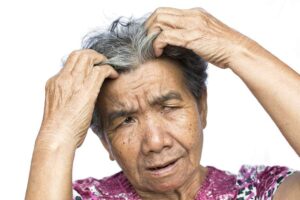
When levels of estrogen and progesterone drop during menopause, the effects of androgens (male hormones) increase.
And as the body prepares to enter menopause, hormone levels (including those that support hair growth) change significantly.
Here’s the trick, though. Your biological age is just as critical as your chronological age. In other words, you might be 30 years old with the wear and tear (because of nutritional choices, chemical exposure, and environmental factors) of a 50 year old. Or, you could be 50 years old with the wear and tear of a 30 year old. While none of us will live forever, good nutrition and health practices (more on that below) can keep your body and your hair in good health longer.
Genetics
Sometimes, the unique genetic combination you inherited from your parents can predispose you to thin hair, or hair that falls out readily.
If that’s your situation, you’ll want to be extra aware of your hormone levels, endocrine disruptors, and stress. If you’re already predisposed to thinning hair, you’re likely to notice a more dramatic response to these common triggers for hair loss.
Tips For How To Grow Thicker, Healthier Hair
In addition to teasing out the deficiencies and medical and environmental conditions that may be causing your thin hair, there are a number of things you can do proactively to grow thicker, shinier, healthier hair.
Get Tested for Hormone Levels and Iodine Levels
If you suspect you might have an iodine deficiency, or that thyroid dysfunction may be the root of your hair loss, you’re not alone. More than 20 million Americans have a thyroid disorder,9 and 60% of those are undiagnosed.
Make an appointment with a trusted doctor, naturopath, or functional medicine provider to test your iodine levels and hormone levels to find out where you stand, then change your diet and supplement as needed.
[Related: 9 Questions For Your Hormone Doctor]
Eat Raw, Organic Plant-Based Foods
Your diet is one of the absolute best ways to ensure healthy hair. And raw, plant-based organic fuel should be your staple! Why?
- Organic, so you skip the endocrine disruptors that can wreak havoc on your health and your hair
- Plant-based, because study after study shows that we humans were meant to live on a mostly plant-based diet: Our teeth are designed primarily for eating plants, and so is our digestive system. Nutrients from plant food are also plentiful and extremely bioavailable--meaning, they’re easiest for our bodies to use and absorb.
- And finally, mostly raw--because cooking many fruits and vegetables destroys valuable digestive enzymes and nutrient content.
[Related: Green Smoothies To Balance Female Hormones Naturally]
Stack Your Diet with Foods that Promote Healthy Hair
The following plant foods are rich sources of key nutrients that promote healthy hair. Plan your shopping list and your meals around them for beautiful hair and better health:
Sweet Potatoes
This powerhouse plant food is packed with beta-carotene, which the body uses to create Vitamin A. Vitamin A helps keep hair follicles in the growth phase,10 as well as helping the body produce sebum, an oily substance that keeps hair protected and moisturized.
Sprouted Flax, Chia, or Broccoli Seeds
Plant-based essential fatty acids like sprouted flax, broccoli, or chia seeds offer an abundance of Omega 3 and Omega 6, to keep hair follicles healthy and protected One study showed that 87% of women who supplemented with Omega 3 and Omega 6 saw thicker hair!11 The easiest way to add these superfoods to your diet is a shelf-stable blend you can add to smoothies, on salads, or in baked goods.
Almonds
Nuts are a fantastic source of protein--vital to hair growth! Almonds in particular pack a protein punch in addition to Vitamin E, B vitamins, essential fatty acids, and zinc.
[Related: 13 Top Raw Almonds Benefits, And How To Get Truly Raw Almonds]
Avocados
Avocados are another great go-to for vitamin E, essential fatty acids, potassium and antioxidants. Remember, oxidative stress can lead to hair loss, and eating antioxidant-rich foods is a fantastic way to fight back!
Mushrooms
Mushrooms are one of the very few plant-based options for Vitamin D! Incorporating plenty of mushrooms into your diet can help you get enough of this important mineral that allows your hair follicles to use protein correctly.
Broccoli or Broccoli Sprouts
Broccoli is a great source of sulfur, which helps your cells use oxygen and clear out waste products--and are recognized as major cancer-fighters, to boot. Even better, opt for broccoli sprouts, which contain 20-50% more sulforaphanes than mature broccoli!12 Because pesticides break the sulfur cycle in plants, organic versions are best.
[Related: Which foods should you always buy organic, and which don’t matter?]
Spinach
Organic spinach is another good source of sulfur, not to mention vitamin A and iron! All of these important nutrients help sustain growth in the hair follicles, and help your red blood cells deliver oxygen to your skin and hair cells.
Red Bell Peppers
Did you know that red bell peppers have more than twice the vitamin C found in an orange? It’s true! And Vitamin C helps your body make collagen13— an important protein that improves the strength and elasticity of hair. Vitamin C is also important for iron absorption.
Get your Vitamin C from plant foods--new research shows that ascorbic acid (the “Vitamin C” in most supplements) can harm your health.
Nori
There aren’t a lot of good plant-based sources of iodine, but seaweed like Nori is a shining star. Whether you use it in sushi, sprinkled on salads as a topping, or as a crunchy snack, nori delivers iodine, which fortifies your thyroid and fosters healthy, thick hair. Close cousins of Nori, kelp and dulse, are also fantastic plant-based sources of iodine.
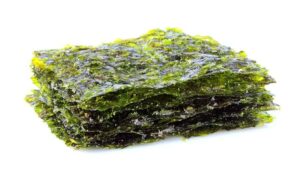
Nori is a plant-based source of iodine, a crucial nutrient for thyroid function that controls hair growth.
Legumes
Legumes are a great plant-based source of protein, iron, folate, zinc, and biotin. They’re also a good source of complex carbohydrates, which are crucial for energy production and cell metabolism.
[Related: How To Eat Legumes]
Supplement with Fulvic Minerals
Modern strip-farming means that much of our agricultural soil is dangerously depleted of vital nutrients and trace minerals. In other words, even if you’re eating plant-based food, it may be much lower in nutrients and minerals than it should be.
Supplementing with fulvic and humic acid that’s a highly concentrated blend of nutrients and minerals is one of the best ways to make sure you’re getting enough trace minerals and vital nutrients for hair health — without resorting to one of those processed, chemical-laden “vitamin” gummies.
Switch Up Your Shampoo and Hair Care Routine
You don’t need a magic shampoo that’s marketed to deliver the mane of a lion. But you should watch out for shampoos that contain endocrine disruptors, harsh chemicals, dyes, and “fragrance.” Natural shampoos that are free from anything ending in “ate” (like sulphates) are going to help with breakage and damage that leads to hair loss.
Try using a mixture of equal parts aloe vera and extra-virgin coconut oil as a deep conditioner to infuse your hair with extra vitamin E, A, and C. You’ll get a beautiful shine, extra resistance to breakage, fewer tangles, and less dandruff to boot!
If you want to really deep condition, do what I do and wear the mixture overnight under a stocking cap, then wash it out the next morning. Get ready for lots of compliments on those silky locks!
Try Red Light Therapy
Did you know that light is a nutrient? It’s true! Our cells need light to grow, survive, and function optimally.
Specifically, we need red and NIR (near infrared) light, which comes from the wavelengths in natural sunlight and activates our mitochondria to stimulate ATP/energy production.
The cells in your hair are no exception. Red light therapy can help stimulate the growth of sluggish hair follicles, regrow hair that’s thinning, and encourage hair to grow thicker and faster. Home red light therapy units are increasing in popularity, but make sure you know what to look for in a quality red light therapy unit before making a purchase!
Conclusions About Thinning Hair
While we typically think of hair loss as a male problem, more women than ever struggle with thinning, fragile, prematurely gray hair. And the problem isn’t just cosmetic: Premature hair loss can be a more accurate warning sign than obesity for heart disease!
The good news is, there’s a lot that can be done to mitigate hair loss and improve your overall health. Taking steps to improve your nutrition and hair care, as well as determining the cause of your hair loss — whether a vitamin deficiency, a medical condition, or environmental factors — can help restore thick, shiny, beautiful hair.
Read next: Get Healthier Teeth and Gums with these 7 Foods for Oral Health

Disclosure: This post may contain affiliate links that help support the GSG mission without costing you extra. I recommend only companies and products that I use myself.
Resources
- International Society of Hair Restoration Surgery, 2010 Hair Transplant Challenge Survey Results. RH Research, September 2010.
- European Society of Cardiology. "Male-pattern baldness and premature graying associated with risk of early heart disease: Both were stronger risk factors than obesity." ScienceDaily, 30 November 2017.
- Chen, Stephen. South China Morning Post, “Chinese people losing their hair earlier than ever before, research shows.” July 20, 2018.
- Ahad F, Ganie SA. Iodine, Iodine metabolism and Iodine deficiency disorders revisited. Indian J Endocrinol Metab. 2010;14(1):13-7.
- Watanabe F, Yabuta Y, Bito T, Teng F. Vitamin B₁₂-containing plant food sources for vegetarians. Nutrients. 2014;6(5):1861-73. Published 2014 May 5. doi:10.3390/nu6051861
- Watanabe F, Yabuta Y, Bito T, Teng F. Vitamin B₁₂-containing plant food sources for vegetarians. Nutrients. 2014;6(5):1861-73. Published 2014 May 5. doi:10.3390/nu6051861
- Alemu A, Terefe B, Abebe M, Biadgo B. Thyroid hormone dysfunction during pregnancy: A review. Int J Reprod Biomed (Yazd). 2016;14(11):677-686.
- Reijnen A., Geuze, E. Vermetten, E. “The effect of deployment to a combat zone on testosterone levels and the association with the development of posttraumatic stress symptoms: A longitudinal prospective Dutch military cohort study.” Psychoneuroendocrinology, ISSN: 1873-3360, Vol: 51, Page: 525-33. April 2014.
- American Thyroid Association, Press Room, Accessed Feb 27, 2019.
- Terezakis, Nia K. et al. “Retinoids: Compounds important to hair growth.” Clinics in Dermatology, Volume 6 , Issue 4 , 129 - 131.
- Caroline Le Floc'h, Ahsène Cheniti, Sophie Connétable, Nathalie Piccardi, Colombina Vincenzi. “Effect of a nutritional supplement on hair loss in women.” Journal of Cosmetic Dermatology, January 2015.
- Johns Hopkins Medical Institutions. "Cancer Protection Compound Abundant In Broccoli Sprouts, Johns Hopkins Scientists Find." ScienceDaily,19 September 1997.
- Pullar JM, Carr AC, Vissers MCM. The Roles of Vitamin C in Skin Health. Nutrients. 2017;9(8):866. Published 2017 Aug 12. doi:10.3390/nu9080866
Posted in: Health Concerns, Natural Remedies, Supplements




